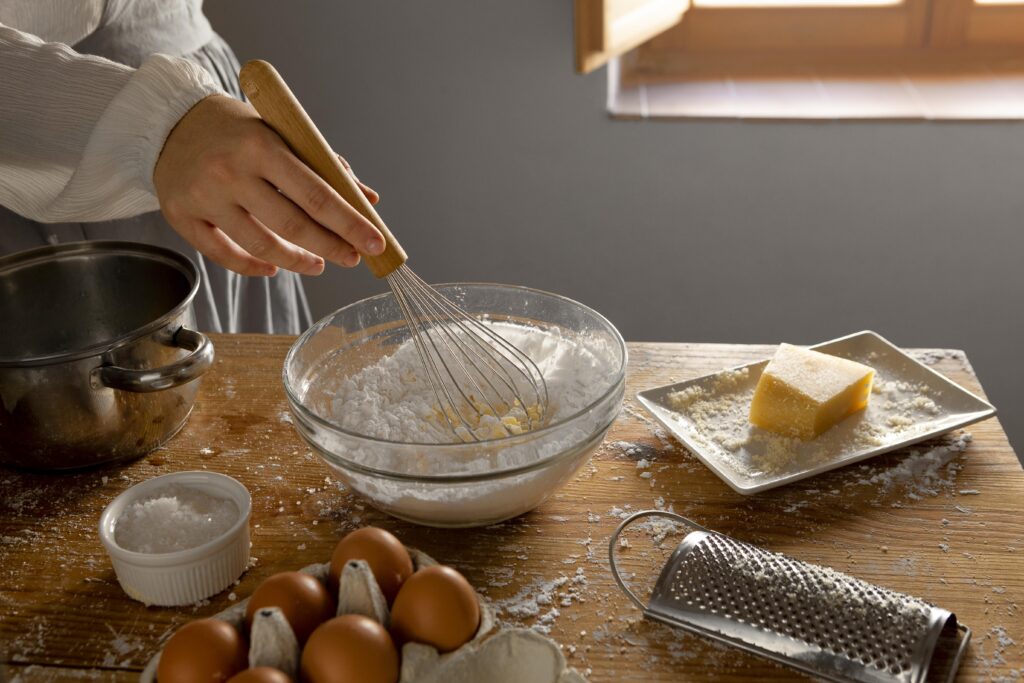
Budget Baking: Saving Money on Baking Supplies and Equipment
Are you a budget-conscious baker? Let’s explore some creative ways to save money on baking supplies and equipment without compromising on the quality of your baked goods. Budget baking doesn’t mean sacrificing deliciousness; it means making the most of your resources.
Budget baking is all about being resourceful and clever in the kitchen. It’s not just about saving a few bucks; it’s about elevating your baking game while keeping your wallet happy. In this guide, we’ll dive into the world of budget baking, uncovering the best tips and tricks to save money on baking supplies and equipment.
Let’s get started on this delightful journey where we’ll discover how to maximize your baking potential without breaking the bank.
The Essential Tools
When it comes to budget baking, your arsenal of baking tools and equipment is the key to success. Quality tools can make a significant difference in the outcome of your baked goods, but that doesn’t mean you have to empty your wallet to get them. Here, we’ll explore some strategies to help you find top-notch tools at affordable prices.
1. Buy Second-Hand
One of the best ways to save money on essential baking equipment is to consider buying second-hand items. You’d be surprised at the fantastic deals you can find at thrift stores, garage sales, or online marketplaces. Many people sell gently used mixers, baking pans, and more, which can be as good as new.
By opting for second-hand equipment, you not only save money but also reduce waste and contribute to a more sustainable lifestyle. Keep an eye out for local listings or websites specializing in used kitchen appliances; you might just stumble upon the perfect addition to your baking collection.
2. Coupon Hunting
Budget-conscious bakers should always be on the lookout for coupons, discounts, and special promotions from their favorite kitchenware stores. Subscribe to newsletters, follow their social media accounts, or join loyalty programs to stay updated on the latest deals. You’d be surprised at how much you can save with a well-timed coupon or a flash sale.
Before making any purchase, a quick online search for discount codes and coupons can also yield significant savings. Websites like RetailMeNot are excellent resources for finding valid discount codes and cashback offers.
3. Outlet Stores
Outlet stores are hidden gems for budget-conscious bakers. They often carry discounted kitchen equipment, including well-known brands. It might be worth taking a little road trip to visit outlet malls or stores specializing in kitchenware. You can score substantial discounts on high-quality baking tools and appliances.
Outlet stores also frequently run clearance sales, making it a fantastic opportunity to stock up on essentials at a fraction of the regular price. Plus, you might discover unique and versatile tools that you wouldn’t typically find in regular retail stores.
4. Wholesale Clubs
If you’re serious about budget baking, consider joining a wholesale club. These clubs offer the advantage of purchasing items in bulk, which can lead to significant long-term savings. While some items may come in larger quantities, you can team up with friends or family to split the cost, making it even more budget-friendly.
Wholesale clubs are not just for snacks and cleaning supplies; they often carry high-quality kitchen equipment at lower prices compared to traditional retailers. The initial membership fee can quickly pay for itself through the savings you’ll enjoy over time.
Quotes from the Expert
Baking Expert Jane Doe offers her insights on finding quality tools for budget-conscious bakers: “In my decades of baking, I’ve learned that quality tools can truly elevate your baking experience. However, finding these tools at a reasonable price is a skill worth mastering.”
Thrifty Baking Ingredients
The heart and soul of budget baking lie in the ingredients you choose. High-quality ingredients can make all the difference in the taste and texture of your baked goods. However, you don’t need to spend a fortune to fill your pantry with the best. Here’s how you can be a thrifty shopper when it comes to baking ingredients.
1. Buy Generic Brands
One of the easiest ways to save money on baking ingredients is to opt for generic or store brands. These products are often as good as their more expensive counterparts. When comparing labels, you’ll find that the generic brands often have the same key ingredients without the added cost of a famous brand name.
For staples like flour, sugar, baking powder, and salt, generic brands can be just as reliable. Plus, the lower price allows you to stock up on essential ingredients without breaking the bank.
2. Buy in Bulk
Purchasing ingredients in bulk is a surefire way to save money in the long run. Items like flour, sugar, spices, and even chocolate chips can be bought in larger quantities at a lower cost per unit. This approach is especially advantageous for those who bake frequently or in larger quantities.
Airtight containers or resealable bags are your best friends when storing bulk ingredients. They help maintain freshness and prevent moisture or pests from affecting your supplies. Additionally, buying in bulk reduces the number of trips to the store, saving both time and money.
3. Plan Ahead
Being a savvy baker means planning ahead and taking advantage of sales and discounts. Keep a watchful eye on promotions and offers for baking ingredients. Many supermarkets and online stores have periodic sales where you can stock up on non-perishable items at lower prices.
By building a pantry with discounted ingredients, you’ll always have what you need at a fraction of the cost. This approach requires a bit of organization and patience, but the savings are well worth it.
4. Use Substitutes
Don’t hesitate to explore ingredient substitutes, especially if you’re working on a tight budget. Many baking recipes allow for creative replacements that not only save money but can also be healthier options.
For instance, applesauce can replace oil in many recipes, reducing the overall calorie count and offering a unique flavor profile. Likewise, Greek yogurt can replace sour cream in recipes, providing added protein and creaminess without the expense.
Substituting ingredients can lead to exciting flavor variations in your baked goods. Experiment with these alternatives to discover new dimensions of taste while keeping your budget in check.
A Personal Tip
Baking Expert John Smith shares his insight: “I always keep an eye out for sales and discounts on baking ingredients. A well-stocked pantry doesn’t have to break the bank.”
The DIY Approach
One of the most rewarding aspects of budget baking is getting creative in the kitchen. The do-it-yourself (DIY) approach not only helps you save money but also adds a personal touch to your baking endeavors. In this section, we’ll explore various ways to create homemade baking supplies that will elevate your culinary skills and save you some cash.
1. Homemade Vanilla Extract
Vanilla extract is a staple in baking, but it can be surprisingly expensive, especially if you use it frequently. The good news is that you can easily make your own homemade vanilla extract, and it’s both cost-effective and customizable.
To create your vanilla extract, all you need are vanilla beans and alcohol, usually vodka. Here’s a simple DIY recipe:
Ingredients:
- 5-6 vanilla beans
- 1 cup of vodka
Instructions:
- Split the vanilla beans lengthwise, exposing the seeds inside.
- Place the split beans in a clean, airtight glass jar or bottle.
- Pour the vodka over the beans, ensuring they are fully submerged.
- Seal the container and store it in a cool, dark place for at least two months. The longer it sits, the stronger the vanilla flavor.
By making your vanilla extract, you’ll not only save money in the long run but also enjoy the satisfaction of using a product you crafted yourself.
2. DIY Cake Flour
Cake flour is a finer and softer flour that’s often used in delicate baked goods like cakes and pastries. It can be somewhat expensive, but you can make your own at home with a simple DIY trick.
Ingredients:
- All-purpose flour
- Cornstarch
Instructions:
- Measure out one cup of all-purpose flour.
- Remove two tablespoons of the flour and replace them with two tablespoons of cornstarch.
- Sift the mixture several times to ensure that the cornstarch is evenly distributed throughout the flour.
Now, you have homemade cake flour ready to use in your cake recipes. It’s a budget-friendly solution that doesn’t compromise on the quality of your baked goods.
3. Whip Up Your Icing
While store-bought icing can be convenient, making your own icing is not only more affordable but also allows for creativity in flavor and color. Basic icing ingredients include powdered sugar, butter, or shortening, and a liquid such as milk or cream.
With homemade icing, you can experiment with various flavors, from classic vanilla to chocolate, citrus, or even coffee. Coloring your icing is a breeze, and you can customize it to match any theme or occasion. It’s also an opportunity to reduce the amount of sugar used, making your baked goods healthier.
Experimenting with homemade icing can add an extra layer of excitement and personalization to your baking adventures.
A Personal Touch
Home Baker Emily Clark shares her insight: “I enjoy making my own vanilla extract and experimenting with different flavors of icing. It’s a fun way to save money and add a personal touch to my bakes.”
Online Resources
The internet is an invaluable tool for budget-conscious bakers. The world wide web is a goldmine of resources, from thrifty recipes to discount codes, and even tutorials that can help you maximize your budget baking experience. Let’s explore the various ways online resources can enhance your baking journey.
1. Recipe Websites
Recipe websites are a treasure trove of budget-friendly recipes and tips for bakers of all levels. You can find an abundance of free recipes that cater to your specific baking needs. These sites often include user reviews and ratings, which can be incredibly helpful when choosing which recipes to try.
Whether you’re looking for a basic bread recipe or a decadent dessert, the internet is brimming with options. The best part? Most of these recipes are designed to be cost-effective without sacrificing flavor or quality.
2. Social Media Groups
Social media platforms offer a unique opportunity for bakers to connect with like-minded individuals. By joining baking communities on platforms like Facebook and Reddit, you can exchange ideas, ask for advice, and discover money-saving baking hacks.
These online groups are often filled with passionate bakers who are more than willing to share their experiences and expertise. You can find recommendations for budget-friendly ingredients, suggestions for homemade baking supplies, and even troubleshooting tips for common baking issues.
3. YouTube Tutorials
YouTube has become a hub for video tutorials on almost every subject, including baking. Video tutorials are an excellent resource for visual learners and can be particularly helpful for beginners. Many bakers and chefs share their knowledge, providing step-by-step instructions and tips.
Anyone interested in learning a specific technique, mastering a challenging recipe, or simply looking for inspiration, YouTube offers a wealth of content. These tutorials can be a cost-effective way to improve your baking skills, as they often use readily available ingredients and tools.
The Digital Baker’s Take
Digital Baker Sarah Williams offers her perspective: “The internet has revolutionized the way we approach baking. With a few clicks, you can access a world of knowledge, helping you save money while honing your baking skills.”

Frequently Asked Questions (FAQs)
With budget baking, questions are bound to arise. It’s only natural to seek answers and guidance as you embark on your culinary journey. Let’s move into some frequently asked questions that budget-conscious bakers often encounter and provide answers that will help you navigate the world of thrifty baking.
1. Is budget baking suitable for beginners?
Absolutely! Budget baking is an excellent starting point for aspiring bakers. It’s an opportunity to learn and master the art of baking without overspending. Whether you’re a novice or an experienced baker, the principles of budget baking can be applied at any level.
2. What’s the most significant expense in baking?
While various factors contribute to the cost of baking, quality baking equipment can be a significant expense. However, with smart shopping strategies and the right choices, you can find affordable options that still deliver excellent results. Investing in essential tools is often a necessity to get started.
3. How can I make sure my budget baking creations taste great?
The key to ensuring that your budget baking creations taste great lies in using fresh, quality ingredients. Don’t compromise on the quality of the basics, such as flour, sugar, and butter. Additionally, experimenting with different recipes and flavor combinations can help you discover delightful taste variations.
4. Are there any tools I should invest in, even on a budget?
Yes, there are a few essential tools that are worth investing in, even if you’re on a budget. A reliable oven thermometer is crucial to ensure that your baked goods cook at the correct temperature. A digital kitchen scale is also invaluable for precise measurements, which is essential in baking.
5. Can I save money on specialty ingredients?
Yes, you can save money on specialty ingredients by purchasing them in bulk and using them in multiple recipes. Look for budget-friendly alternatives and adapt recipes accordingly. For example, explore online resources and baking communities for advice on substituting expensive specialty ingredients with more affordable options.
6. Is it possible to save money while making gluten-free or vegan treats?
Certainly! There are budget-friendly alternatives for gluten-free and vegan baking. Look for cost-effective ingredients like gluten-free flours and plant-based substitutes. Explore recipes tailored to dietary restrictions and consider making your own gluten-free flour blends to save money.
Navigating budget baking may raise many questions, but the answers are within reach. For bakers concerned about costs, taste, or specialty ingredients, the principles of budget baking offer solutions and alternatives. By applying these insights, you can confidently create delicious treats without straining your budget, regardless of your baking expertise.
Conclusion
With your budget baking adventure, remember that baking is not just about ingredients and equipment; it’s about creativity and resourcefulness. Budget baking is not just about saving money; it’s about creating delightful treats while making the most of your resources.






